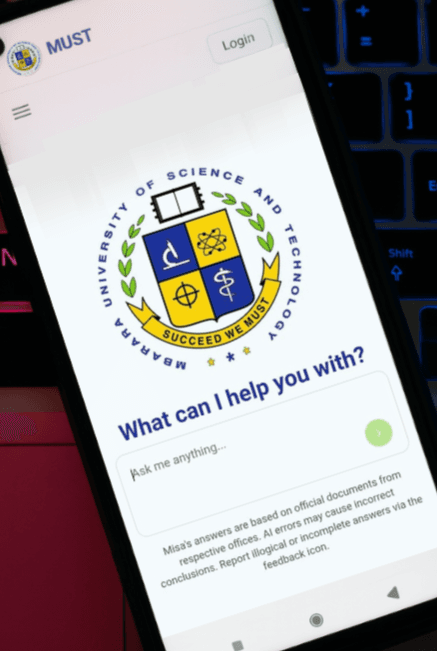MISA – MUST Intelligent Student Advisor
Revolutionizing Student Support with AI at Mbarara University of Science & Technology (MUST)
MISA is a virtual assistant powered by OpenAI's GPT-4 model. It was developed to provide current and prospective students with responses to a wide range of queries about MUST programs, application procedures, academic policies, and campus life.

Overview
Wanyana.Africa partnered with MUST to develop an AI-powered virtual assistant MISA (MUST Intelligent Student Advisor) which has revolutionized how students interact with university services, access information, and receive support throughout their academic journey.
About MISA
MISA is an AI-powered virtual assistant designed specifically for MUST to enhance communication and student support. Built on advanced Large Language Model (LLM) technology and enhanced with Retrieval-Augmented Generation (RAG), MISA connects directly to an institution's knowledge base to provide instant, accurate, and context-aware responses to queries anytime, anywhere. By automating thousands of routine inquiries, MISA helps reduce administrative workload, improve response efficiency, and deliver a modern, AI-driven experience that keeps students informed and engaged.
LLM-Powered
24/7 Available
RAG-Enabled
Secure Access
The Solution
LLM-Powered Intelligence
Advanced large language model that understands student queries in natural language and intelligently determines when to access knowledge sources. Provides contextually relevant answers to questions about admissions, registration, fees, and campus life with high accuracy.
RAG-Enabled Retrieval
Retrieval-Augmented Generation (RAG) queries the vector database to retrieve accurate, up-to-date information from university policies, academic calendars, course catalogs, and administrative procedures. Ensures responses are grounded in verified university data.
24/7 Availability
Always-on virtual assistant providing instant support to students at any time of day or night. Eliminates wait times and ensures students can access critical information whenever they need it, improving overall satisfaction and engagement.
Secure Access & Authentication
Built-in security features with user authentication to protect student data and ensure authorized access. Students can securely log in hence maintaining data privacy and compliance with university security standards.
Results & Impact
Increased student engagement
Students now actively seek information and updates through the virtual assistant
Reduction in administrative workload
Staff can focus on complex issues while the AI handles routine inquiries
Student satisfaction rate
Students report high satisfaction with response accuracy and speed
24/7 availability
Students get instant answers anytime, anywhere, improving overall experience
85% query resolution rate
Most student questions are resolved without human intervention
High adoption rate
High adoption rate with students using the assistant multiple times per week
Data insights
Better data insights into student needs and common challenges
What Our Partners Say
"MISA is not only a game changer, but also a flagship in the university's transformation of student support through the use of an AI powered innovation. It has set the stage on how AI can be contextualized and demystified at Mbarara University of Science and Technology. Through its accurate and intelligent responses, the administrative overheads of managing stakeholder queries shall never be the same again...."
Amos Baryashaba
Principal IT Officer, Mbarara University of Science and Technology
"As a student, MISA has been incredibly helpful. I can get answers about course registration, exam schedules, and university policies at any time of day. It's like having a personal assistant who knows everything about the university. The response time is instant, and the answers are always accurate."
Ocen Innocent
Student, MUST
Why this for Your Institution?
Proven Track Record
Successfully deployed at major institutions with 95%+ satisfaction rates and great improvement in student engagement.
Customizable & Scalable
Fully customizable to your institution's needs and branding. Scales effortlessly from hundreds to thousands of users.
Quick Deployment
Get up and running in weeks, not months. Our proven implementation process ensures smooth integration with minimal disruption.
Ongoing Support
Dedicated support team, regular updates, and continuous AI training to improve accuracy and add new capabilities.
Perfect for: Universities, Colleges, Training Institutions, Corporate Training Centers, Government Educational Bodies, and any organization that needs to provide instant, accurate information to students, customers, staff or trainees.
Technologies & Capabilities
Ready to Transform Your Institution?
Join MUST and other leading institutions in providing exceptional 24/7 support to your students. Reduce administrative workload while improving student satisfaction.
Quick Setup
Live in 4-6 weeks
Flexible Pricing
Scalable plans available
Full Support
Training & maintenance included